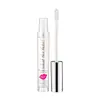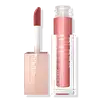What's inside
What's inside
 Key Ingredients
Key Ingredients

 Benefits
Benefits

 Concerns
Concerns

 Ingredients Side-by-side
Ingredients Side-by-side

Bis-Diglyceryl Polyacyladipate-2
EmollientPolybutene
Tridecyl Trimellitate
EmollientDiisostearyl Malate
EmollientHydrogenated Microcrystalline Wax
Emulsion StabilisingDipentaerythrityl Hexahydroxystearate/Hexastearate/Hexarosinate
Skin ConditioningSilica
AbrasiveGlyceryl Behenate/Eicosadioate
EmollientVanillyl Butyl Ether
MaskingSodium Hyaluronate
HumectantTocopheryl Acetate
AntioxidantHydrogenated Jojoba Oil
AbrasiveMica
Cosmetic ColorantEthyl Menthane Carboxamide
TonicEthylhexylglycerin
Skin ConditioningButylene Glycol
HumectantWater
Skin ConditioningVitis Vinifera Seed Extract
AntimicrobialPhenoxyethanol
PreservativeParfum
MaskingCI 77891
Cosmetic ColorantBis-Diglyceryl Polyacyladipate-2, Polybutene, Tridecyl Trimellitate, Diisostearyl Malate, Hydrogenated Microcrystalline Wax, Dipentaerythrityl Hexahydroxystearate/Hexastearate/Hexarosinate, Silica, Glyceryl Behenate/Eicosadioate, Vanillyl Butyl Ether, Sodium Hyaluronate, Tocopheryl Acetate, Hydrogenated Jojoba Oil, Mica, Ethyl Menthane Carboxamide, Ethylhexylglycerin, Butylene Glycol, Water, Vitis Vinifera Seed Extract, Phenoxyethanol, Parfum, CI 77891
C18-36 Acid Triglyceride
EmollientBis-Diglyceryl Polyacyladipate-2
EmollientPentaerythrityl Tetraisostearate
EmollientPolybutene
Tridecyl Trimellitate
EmollientDiisostearyl Malate
EmollientSilica Dimethyl Silylate
EmollientPhenoxyethanol
PreservativeEthylhexyl Palmitate
EmollientPentaerythrityl Tetra-Di-T-Butyl Hydroxyhydrocinnamate
AntioxidantCalcium Sodium Borosilicate
Ethylhexylglycerin
Skin ConditioningCalcium Aluminum Borosilicate
Tocopheryl Acetate
AntioxidantSodium Saccharin
MaskingSorbic Acid
PreservativeAlumina
AbrasiveSilica
AbrasivePolybutylene Terephthalate
Trihydroxystearin
Skin ConditioningCocos Nucifera Oil
MaskingAluminum Hydroxide
EmollientEthylene/Va Copolymer
Emulsion StabilisingAcrylates Copolymer
Tin Oxide
AbrasiveSodium Hyaluronate
HumectantSynthetic Fluorphlogopite
Tocopherol
AntioxidantMagnesium Silicate
AbsorbentGlucomannan
Skin ConditioningParfum
MaskingCI 77891
Cosmetic ColorantCI 77491
Cosmetic ColorantCI 77492
Cosmetic ColorantCI 77499
Cosmetic ColorantMica
Cosmetic ColorantCI 45410
Cosmetic ColorantCI 15850
Cosmetic ColorantCI 75470
Cosmetic ColorantCI 17200
Cosmetic ColorantCI 45380
Cosmetic ColorantCI 15985
Cosmetic ColorantCI 19140
Cosmetic ColorantCI 42090
Cosmetic ColorantFish Oil
Skin ConditioningC18-36 Acid Triglyceride, Bis-Diglyceryl Polyacyladipate-2, Pentaerythrityl Tetraisostearate, Polybutene, Tridecyl Trimellitate, Diisostearyl Malate, Silica Dimethyl Silylate, Phenoxyethanol, Ethylhexyl Palmitate, Pentaerythrityl Tetra-Di-T-Butyl Hydroxyhydrocinnamate, Calcium Sodium Borosilicate, Ethylhexylglycerin, Calcium Aluminum Borosilicate, Tocopheryl Acetate, Sodium Saccharin, Sorbic Acid, Alumina, Silica, Polybutylene Terephthalate, Trihydroxystearin, Cocos Nucifera Oil, Aluminum Hydroxide, Ethylene/Va Copolymer, Acrylates Copolymer, Tin Oxide, Sodium Hyaluronate, Synthetic Fluorphlogopite, Tocopherol, Magnesium Silicate, Glucomannan, Parfum, CI 77891, CI 77491, CI 77492, CI 77499, Mica, CI 45410, CI 15850, CI 75470, CI 17200, CI 45380, CI 15985, CI 19140, CI 42090, Fish Oil
 Reviews
Reviews

Ingredients Explained
These ingredients are found in both products.
Ingredients higher up in an ingredient list are typically present in a larger amount.
This ingredient is lipid-based synthetic skin-conditioning agent derived from adipic acid and a mixture of fatty acids. It is often called a lanolin substitute.
As an emollient, it helps soften and hydrate the skin. Emollients create a barrier on the skin to trap moisture in.
Due to its fatty acid base, it may not be Malassezia folliculitis safe.
Learn more about Bis-Diglyceryl Polyacyladipate-2Ci 77891 is a white pigment from Titanium dioxide. It is naturally found in minerals such as rutile and ilmenite.
It's main function is to add a white color to cosmetics. It can also be mixed with other colors to create different shades.
Ci 77891 is commonly found in sunscreens due to its ability to block UV rays.
Learn more about CI 77891Diisostearyl Malate is an emollient and most often used in lip products. It comes from isostearyl alcohol, a fatty acid, and malic acid, an AHA.
As an emollient, Diisostearyl Malate helps create a thin film on your skin to trap moisture in. This helps keep your skin soft and smooth.
Ethylhexylglycerin (we can't pronounce this either) is commonly used as a preservative and skin softener. It is derived from glyceryl.
You might see Ethylhexylglycerin often paired with other preservatives such as phenoxyethanol. Ethylhexylglycerin has been found to increase the effectiveness of these other preservatives.
Mica is a naturally occurring mineral used to add shimmer and color in cosmetics. It can also help improve the texture of a product or give it an opaque, white/silver color.
Serecite is the name for very fine but ragged grains of mica.
This ingredient is often coated with metal oxides like titanium dioxide. Trace amounts of heavy metals may be found in mica, but these metals are not harmful in our personal products.
Mica has been used since prehistoric times throughout the world. Ancient Egyptian, Indian, Greek, Roman, Aztec, and Chinese civilizations have used mica.
Learn more about MicaParfum is a catch-all term for an ingredient or more that is used to give a scent to products.
Also called "fragrance", this ingredient can be a blend of hundreds of chemicals or plant oils. This means every product with "fragrance" or "parfum" in the ingredients list is a different mixture.
For instance, Habanolide is a proprietary trade name for a specific aroma chemical. When used as a fragrance ingredient in cosmetics, most aroma chemicals fall under the broad labeling category of “FRAGRANCE” or “PARFUM” according to EU and US regulations.
The term 'parfum' or 'fragrance' is not regulated in many countries. In many cases, it is up to the brand to define this term.
For instance, many brands choose to label themselves as "fragrance-free" because they are not using synthetic fragrances. However, their products may still contain ingredients such as essential oils that are considered a fragrance by INCI standards.
One example is Calendula flower extract. Calendula is an essential oil that still imparts a scent or 'fragrance'.
Depending on the blend, the ingredients in the mixture can cause allergies and sensitivities on the skin. Some ingredients that are known EU allergens include linalool and citronellol.
Parfum can also be used to mask or cover an unpleasant scent.
The bottom line is: not all fragrances/parfum/ingredients are created equally. If you are worried about fragrances, we recommend taking a closer look at an ingredient. And of course, we always recommend speaking with a professional.
Learn more about ParfumPhenoxyethanol is a preservative that has germicide, antimicrobial, and aromatic properties. Studies show that phenoxyethanol can prevent microbial growth. By itself, it has a scent that is similar to that of a rose.
It's often used in formulations along with Caprylyl Glycol to preserve the shelf life of products.
Polybutene is used to help control the viscosity of a product. This just means it helps adjusts the texture.
It is a polymer and does not get absorbed into the skin due to its large size.
Studies found this ingredient did not irritate skin in concentrations below 15%.
Learn more about PolybuteneSilica, also known as silicon dioxide, is a naturally occurring mineral. It is used as a fine, spherical, and porous powder in cosmetics.
Though it has exfoliant properties, the function of silica varies depending on the product.
The unique structure of silica enhances the spreadability and adds smoothness, making it a great texture enhancer.
It is also used as an active carrier, emulsifier, and mattifier due to its ability to absorb excess oil.
In some products, tiny microneedles called spicules are made from silica or hydrolyzed sponge. When you rub them in, they lightly polish away dead skin layers and enhance the penetration of active ingredients.
Learn more about SilicaSodium Hyaluronate is hyaluronic acid's salt form. It is commonly derived from the sodium salt of hyaluronic acid.
Like hyaluronic acid, it is great at holding water and acts as a humectant. This makes it a great skin hydrating ingredient.
Sodium Hyaluronate is naturally occurring in our bodies and is mostly found in eye fluid and joints.
These are some other common types of Hyaluronic Acid:
Learn more about Sodium HyaluronateTocopheryl Acetate is AKA Vitamin E. It is an antioxidant and protects your skin from free radicals. Free radicals damage the skin by breaking down collagen.
One study found using Tocopheryl Acetate with Vitamin C decreased the number of sunburned cells.
Tocopheryl Acetate is commonly found in both skincare and dietary supplements.
Learn more about Tocopheryl AcetateTridecyl Trimellitate is a synthetic ingredient with emollient and skin conditioning properties. It also acts as a texture enhancer and helps products spread easily without feeling greasy.
As an emollient, it forms a light layer on the skin that keeps moisture in and improves water resistance. This is why you'll often find this ingredient in eye creams and other rich treatments.
This ingredient is seen as the elegant alternative to mineral oil.
Learn more about Tridecyl Trimellitate